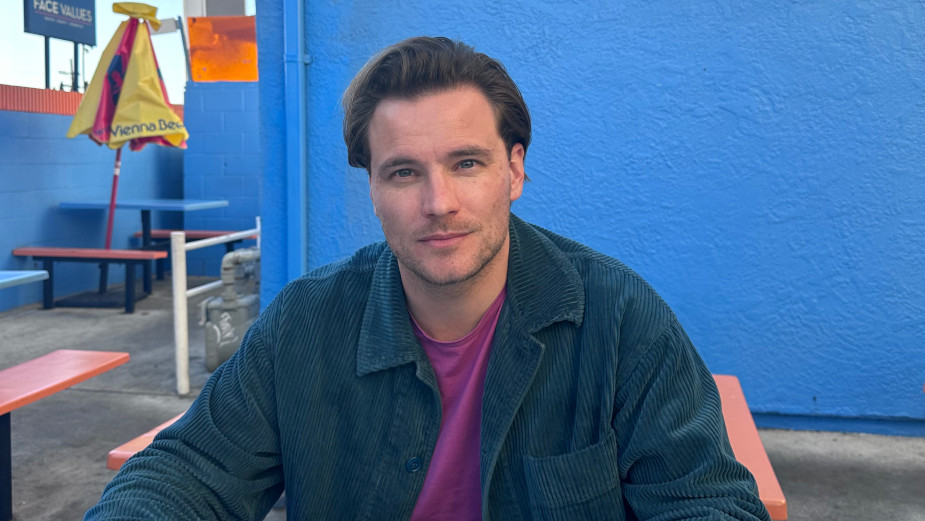
Freddie Waters: Turning Celebrity Talent into Comedians

Freddie Waters’ work is all about characters and his films thrive on performance. Whether it’s extracting humour from the subtleties of everyday scenarios or working with celebrity talent who aren’t experienced with comedy. His work is always well-observed, well-timed and paired with beautiful visuals and meticulous craft.
His ability to marry sporting talent, comedy and visuals take centre stage in his latest commercials for Sports Direct Christmas and Paddy Power. And his eye for comedic realism can be seen in the recent McDonald’s Saver campaign or directing the first series of Peacock on BBC3. This was with the brilliant minds behind People Just Do Nothing and the show was met with critical acclaim with the lead performance by Allan Mustafa described by The Guardian as giving David Brent and Alan Partridge a run for their money.
Many people in the production world know that working with talent can prove extremely difficult, from casting to executing the final idea and doing it on time - so what’s left for working with talent on set that hasn’t really been on set before? Something that has become somewhat of a speciality of Freddie’s. His sense of humour and skill as a director is what helps those that have never set foot on a film set before not only loosen up, but also execute his comedic genius perfectly. On the flip side, his directing shines through when he works with professional actors as well as celebrity talent known for notoriously uncomfortable shooting times due to a packed schedule.
LBB’s Zoe Antonov spoke to Freddie about all the ins and outs of working with sports people and celebrities on set, the approach of ‘let them be them’ and his ‘90s-inspired comedy.
LBB> Freddie, tell me more about your background and how you got into filmmaking.
Freddie> To become a director at some point you have to say “I’m a director” before you’ve ever done it. For me, it was about waiting until someone was willing to pay me to direct something, which wasn’t until I was 28 and it was inevitably branded content.
The aim was to try and get a job in any creative industry really. My first role after university was at the reception of a talent agency, then as an agent’s assistant and later producing branded content. The route through wasn’t super creative - I’ve never made a music video. Respect to the 18-year-olds who just say “I’m a director” and go do it at that point. Very boringly and pragmatically, I didn’t commit until there was solid money on the table and I realised it was a viable career choice. “We have a new brand and £20-30k, can you make a quick film that explains what our brand does and make it funny?”
LBB> What were the key moments or influences that made your filmmaking approach what it is today?
Freddie> I guess like all directors, you kind of know from a very young age it’s what you want. At age six I watched ‘Terminator 2’. I became obsessed with Arnie and just wanted to watch all his films, particularly his comedies. I just loved ‘90s comedies, especially action ones. Jim Carrey, Eddie Murphy (for some reason I watched ‘The Golden Child’ more than ‘Beverly Hills Cop’), Steve Martin, John Candy (there was a six-month period where I watched ‘Cool Runnings’ every morning before school), and Robin Williams. Depressingly I realise as I say this, it’s an all-male lineup. I grew up with a single mum and two sisters and even did a year in an all-girls school aged nine, so perhaps my excuse is these men were my father figures.
Actually, that time was a golden era for the ‘divorced dad that is useless but desperate to see his kids and kept fucking up’ - ‘Mrs Doubtfire’, ‘Liar Liar’, ‘Jingle All The Way’.
LBB> Talk to me about your sense of humour - where do you get inspired to create the comedy that you do?
Freddie> Everything I do really comes back to early ‘90s films. But realistically, like all British people my age, the biggest influences are ‘The Office’ and ‘Peep Show’.
In general, my sense of humour comes back to people being serious. Johnson from Peep Show is the best example of this there is. I really like comedies where the central characters are taking themselves very seriously, rather than cracking jokes.
It’s ironic because I am a really serious person. I talk about comedy so seriously. I’m not a joke-cracking type of person but I love being surrounded by people who are hilarious. I guess that’s why I like making comedy, you get to spend time with really funny people.
I guess I don’t really see myself as a comedy director. I like things that put character and story first - which inevitably leads to comedy. I’m less interested in directing things that are only about jokes.
LBB> Tell me more about the way you approach work with talent that is not used to being on set - what are your tips and tricks?
Freddie> Performance is really just about making people feel comfortable. I think I’m good at this. It’s amazing what you can get out of non-actors once they feel comfortable. Make people feel relaxed and then let them play around. Let them feel like they can do anything, and no one is judging.
I guess it’s about basic emotional intelligence. Everyone is different. You need to understand the person you’re working with and what approach is going to work with them. Whilst some people need and want clear direction, other people hate being told what to do.
LBB> And what are some of the biggest challenges you can face when working with celebrity talent?
Freddie> Time. Celebrity talent is always about time. That’s it. Time is the only challenge.
Celebrity talent is also super hard to get ahold of, where your work with your producer comes into play - ‘How does that work out for you’ and ‘Are there a lot of stressful two-hour shoots?’, ‘How do you manage to do great work on time without rushing it?’.
Even if you have five minutes, everyone has to feel like you have all the time in the world. This is the skill really. We’re 5 hours behind and everyone is losing their minds but on set everyone needs to be calm and joking - no stress. It’s a very difficult internal battle.
It’s your film, you’re in charge, and so I think you need to be the most relaxed person on set at all times.
You also have to make sure you have a lovely team. Yes, they need to be good at their job but are they people you want to hang out with? You have X celebrity talent on the day. Your whole day rests on them being in a good mood and you’re usually the 30th person meeting them. You want your team - especially HMU and stylist - all to be fun and lovely. People who are going to make them walk on set feeling great.
LBB> How do you make your comedy shine through celebrities that are not usually known for comedy and how do you tailor your approach to the different people you work with?
Freddie> The approach is always the same. Let them be them. Meet before to talk it all through. Do they know what’s happening? Do they understand it all? Have they got any ideas? Just the usual very simple questions. Get a bit of a relationship. Find something you can both laugh about (if you’re lucky).
Then when they’re on set let them do their thing. I like to give as little direction as possible. The skill is letting it all come from them. You can’t tell someone to be funny.
You know when you’ve really got their trust when they are asking your opinion. I was lucky enough to have four days with Eric Cantona once. On day two he said, “What do you think, Freddie?” - this was a big moment for me. Possibly the biggest!
LBB> In this light, tell me more about your work with Paddy Power - what were the challenges and the most fun parts behind it? How did you navigate the talent on set?
Freddie> This is the perfect example of working with talent. Two actors, one film heavyweight (Colm Meany) and one ‘Eastenders’ legend (Sean Williamson); two non-actors, a footballer (Peter Crouch, who is hilarious at being himself but is not an actor) and a model (Abby Clancy). They all needed a very different approach. Polar opposites.
I’m really pleased with the performances from all four. Getting them there was equally challenging for each but for totally different reasons. They are all brilliant, you just need to give them the space to be brilliant. That’s the hard part.
LBB> Tell me more about Sports Direct’s ‘Give Me Football’ where essentially you carried the three films through one piece of copywriting - how did that idea come about and how did you manage to work with the talent to deliver it so brilliantly?
Freddie> It was just an amazing idea from Copa 90. Then we were lucky enough to have great talent. I’m really proud of what we achieved with this film because I think the performances are all really strong. It comes back to the same thing I have said all along ‘Give the talent space to do their thing’. It’s that simple. It’s just achieving that which is hard. It comes back to being ruthlessly organised in prep and being really clear with clients and the agency about what is going on, that way you do your thing and be the most relaxed person on set. When the director is relaxed, the talent is relaxed. When the talent is relaxed, they start to do amazing and hilarious things you hadn’t even thought of.












